Resonant Voices Radar exposes false, biased or manipulated online content that feeds division and mobilises support for groups and causes that threaten public safety, human rights, and democracy.
The Resonant Voices Radar’s team monitors the digital ecosystem of open online channels that produce and disseminate misinformation, partisan and extremist propaganda, hate speech, unsubstantiated claims, and other dangerous online messages that spread across borders, languages, and platforms, affecting transnational diaspora communities.
In March 2020, the Resonant Voices Radar analysed the resonance and reach of the following stories:
Europe’s Far-Right Travels to Greece for Anti-Migrant Protests
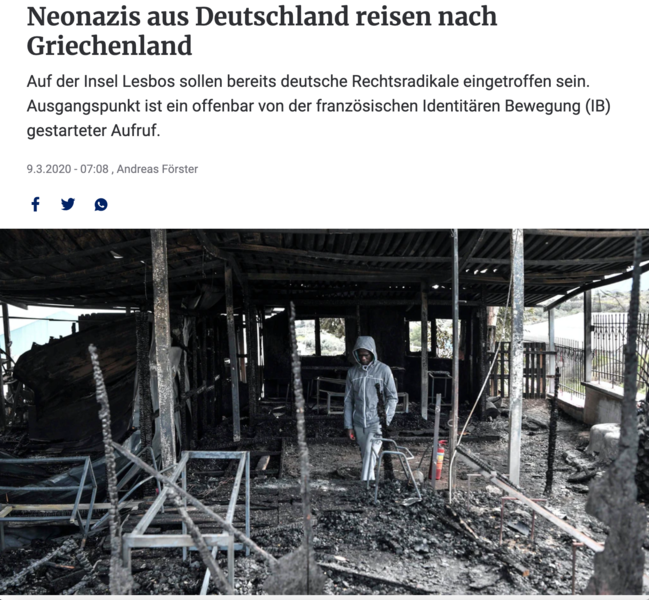
On social media, right-wing extremists across Europe called on volunteers and paramilitary units to mobilize against migrants in Greece. Some influencers, such as Oliver Flesch and other members of the German Identarian movement, went as far as traveling to Greece, posing as journalists to report on conditions there. With staged videos, they generated intentionally misleading and inflammatory content about migrants and refugees in the border region.
The movement’s hashtags, #IstandWithGreece and #GreeceUnderAttack, attempt to redefine European solidarity as uniting against others. In just one week, the hashtags produced over 3,000 retweets on Twitter, including accounts that indicated patterns of inauthentic activity.
Meanwhile, Greek media reported that the far-right attacked refugees, journalists, and volunteers in the area. According to the German newspaper Zeit, “Lesbos islanders and numerous foreign right-wing radicals have been trying for days to prevent refugees from arriving on the island – even by using violence.”
This demonstrates how inflammatory posts online can lead to violent action. The far-right’s attempt to fabricate a threat online evidently has a radicalizing effect, consequently increasing security concerns across Europe.
The Harmful Health Misinformation in Serbian Politics
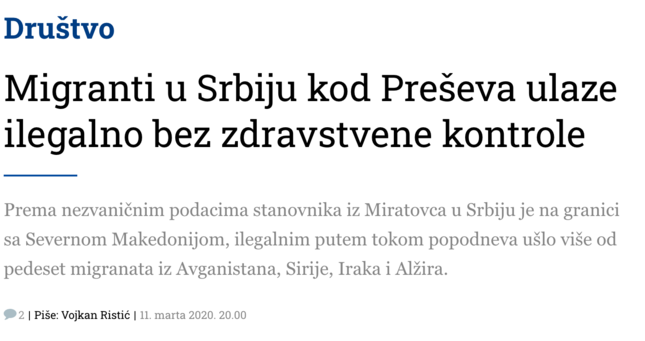
Serbian politicians Dr. Jovana Stojkovic and Goran Davidovic recently made inaccurate and unverified statements about the coronavirus. Despite a lack of data, both alleged the virus was spread by migrants coming from Serbia’s southern border.
Especially concerningly, however, Dr. Stojkovic claimed that philanthropists engineered COVID-19 and that people should be ready to be “inoculated by the state,” referring to a future vaccine for the virus. Supporters responded on Twitter saying they would reject any mandatory vaccination.
These political statements have dangerous repercussions, from the mistreatment of migrants to the spread of the virus. As misinformation causes people to believe they should refuse treatment or misplace blame for the virus, they can put people’s lives at risk.
Italy Becomes Centerpiece of Manipulative Content Across Europe

Online outlets based in Croatia, Serbia, Poland, and Slovenia promoted inaccurate information that characterized Italy’s response to the coronavirus as insufficient compared to authoritarian governments.
This content, primarily on social media and alternative outlets, such as Direktno, Nacionalist, and Top News, fed a wider narrative, which portrayed the spread of the virus as worse where “globalists” and “leftists rule” while praising a more aggressive “military approach.”
By only detailing the crisis in Italy, these outlets painted a skewed picture of the global pandemic. This type of exploitation overlooks the situations in other countries to fuel anger or mistrust toward certain governments. It can also lead readers to question legitimate information that is contradictory or that presents more nuanced details.
Misinformation Demonizes Refugees in German Refugee Center
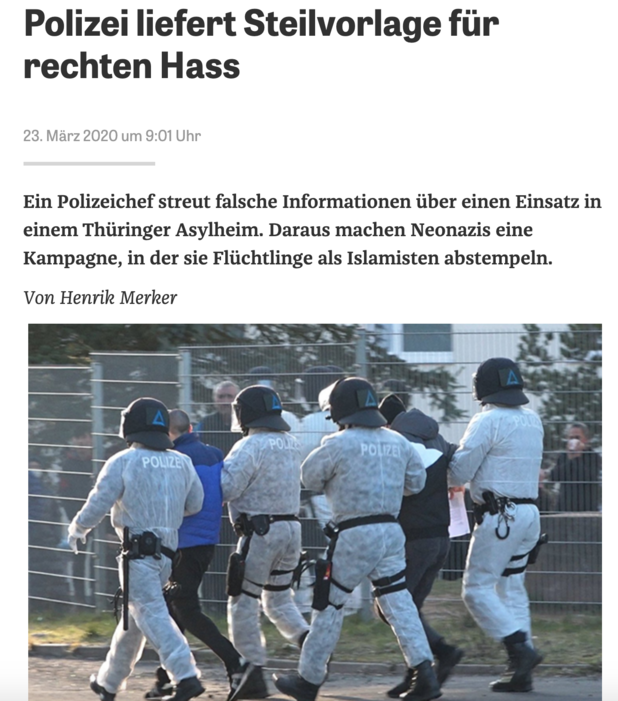
Alternative media, including Russia Today and Junge Freiheit, published misinformation originally from German police that mischaracterized refugees as aggressive extremists.
The misinformation circulated online when a German police chief falsely stated that refugees in a refugee center had an Islamic State flag displayed in “a very aggressive manner.” The police had intervened in a riot at the Thuringia refugee center, after a refugee had been diagnosed with coronavirus and others attempted to break quarantine measures.
Although the police later denied the refugees had an IS flag, the story spurred inflammatory and demeaning comments about refugees on social media and the news portals that published the story.
As a result, the misinformation fueled nationalist and racist ideas that not only demonize migrants, but advocate for violent behavior against them. Despite the correction, the story has motivated online threats against the refugees in the refugee center.
Social Media Users Distort Slovenia’s Health Crisis
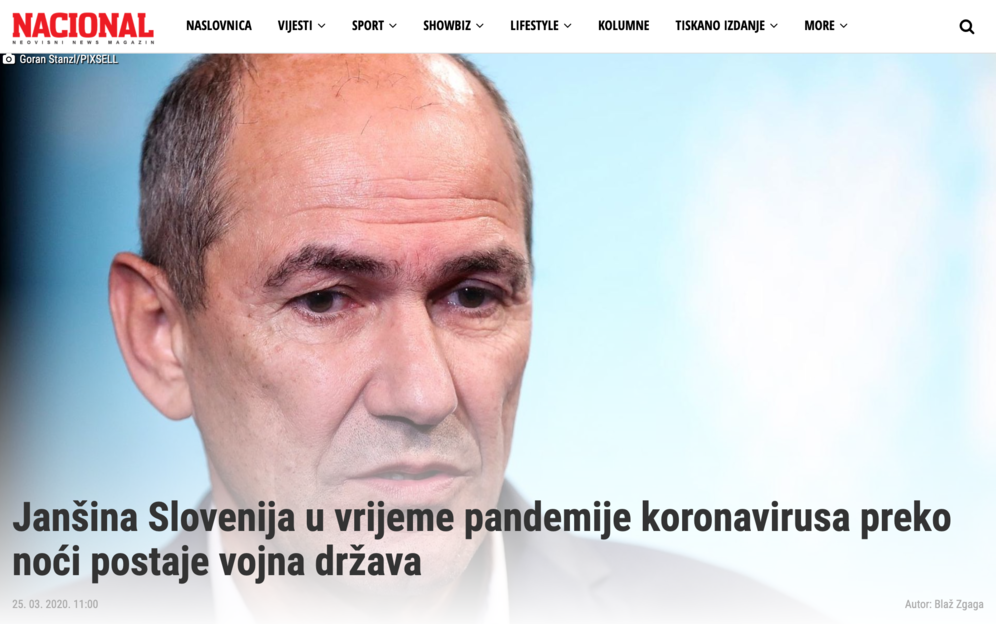
Thousands of social media users used the coronavirus outbreak in Slovenia to advance populist and anti-migrant positions. Most notably, on Twitter, Slovenia’s Prime Minister Janez Jansa accused Member of the European Union parliament Tanja Fajon of waging “an ideological fight” with “no vaccine available,” after Fajon warned Jansa against expanding government powers.
Prime Minister Jansa’s post spurred a range of hate speech against leaders from western Europe, including Fajon. Other social media users blamed migrants for the spread of the coronavirus and for Slovenia’s recent economic downturn.
The recent wave of manipulative messaging reveals how the pandemic can be used to bolster populist positions across the political spectrum. As populist leaders around the globe attempt to centralize power amid the crisis, they commonly use migrants or opposition as scapegoats to accumulate support.
In reality, this narrative uses flawed rationality to undermine individual freedoms, such as freedom of speech or the media. As leaders misrepresent migrants and proponents of civil liberties, they can motivate hate speech and restrictions of rights for entire populations.
Pseudo-Experts Spread Coronavirus Conspiracies Online
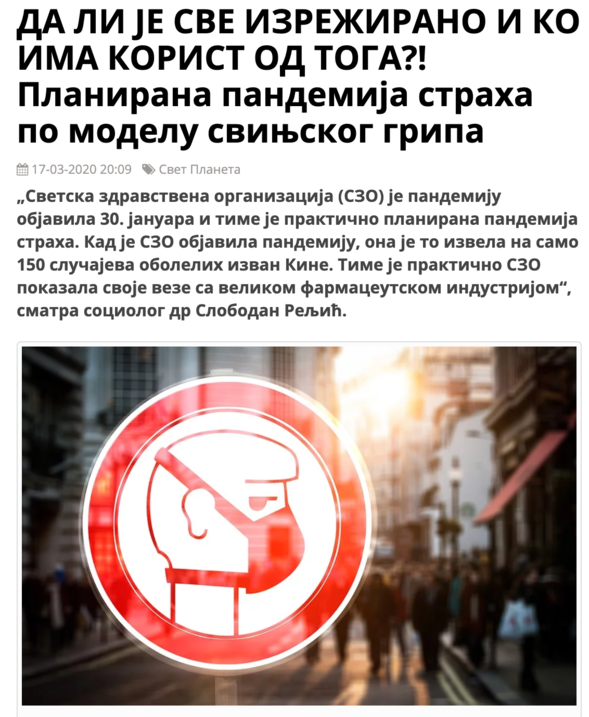
Inter Magazin, and Srpski Dnevnik, published articles and videos with pseudo-experts and religious figures peddling conspiracies about the pandemic.
Many of the pseudo-experts claimed that the virus was created by “globalists” seeking to define a new world order, rather than natural virus. One of the more popular articles produced over 240 shares before it was taken down. Although the portals spread conspiracies that had been repeatedly debunked, their ideas were still prevalent in online discussions.
This underscores the importance of cross-verifying online sources, as so-called experts may lead people to act based on bad information or discount important facts. The promotion of outlandish conspiracies is especially dangerous amid the current outbreak.
Online Media React to Pressure on Germany’s Right-Wing Extremist Groups

The government of Germany provoked a range of reactions among German-language media, after it classified the AfD’s internal movement “The Wing” (der Flügel) an “object of observation” and banned the group “Reich citizens” (Reichsbürger).
While most mainstream media, such as Zeit, TAZ, and Der Standard, and their readers welcomed the decision, those of the right-wing newspaper, Junge Freiheit, reacted in outrage. Some of its readers called the decision a “persecution of dissenters” that was undemocratic and unconstitutional.
These clashing narratives illustrate how polarized the discussion is regarding government responses to far-right extremist groups in Germany. While supporters may characterize the decision as undemocratic, the far-right groups have raised legitimate security concerns.
Croatian Facebook Pages Push Xenophobic Articles
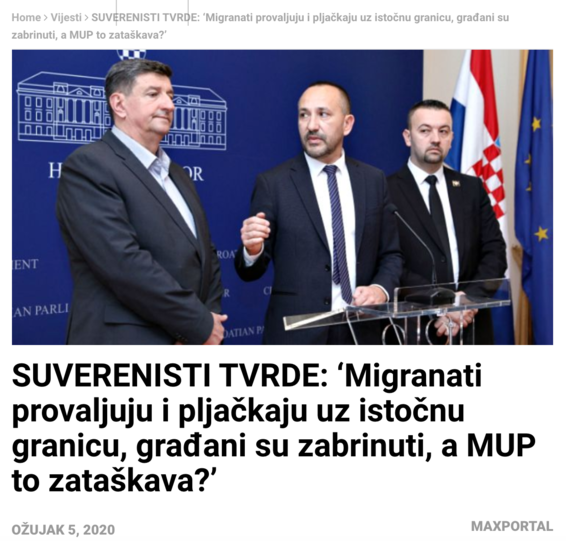
Facebook pages targeting a Croatian audience shared false anti-migrant articles describing an “almost imminent” war between Turkey and Greece that was planned from “the heart of the Islamic world,” while other articles portrayed migrants in the region as violent.
Both topics fueled scaremongering posts about migrants on social media. In particular, Croatian Member of Parliament Ivan Pernar helped spread the anti-migrant stories that were amplified by alternative news outlets, propaganda channels, and individual social media users.
The articles on Facebook were entirely based on discriminatory ideas rather than fact. Social media helps fuel this xenophobia, with the platforms projecting inflammatory posts to a wider audience.
Serbian Outlets Use Misinformation to Promote Anti-Migrant Protests
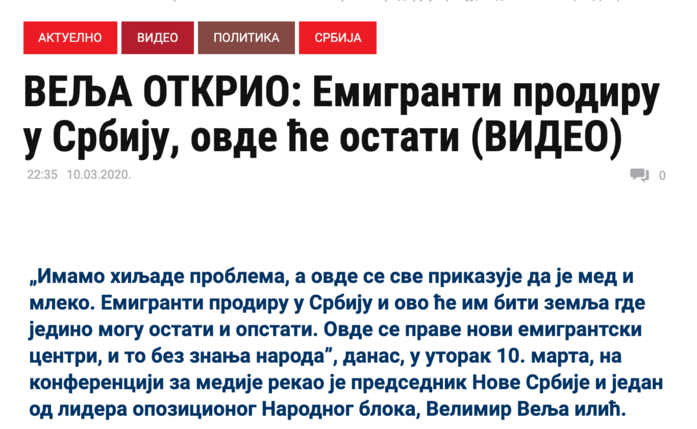
Alternative outlets based in Serbia used misinformation to promote recent anti-migrant protests in Serbia. A number of articles on the portal, Srbin.info, incorrectly stated that migrants in refugee centers would stay in Serbia and warned of an “Islamic migrant invasion.” Meanwhile, the alternative outlet, Balternativa, spread anti-migrant content to the Serbian diaspora in Germany, after which members of the diaspora called on the military to protect Serbia’s borders against migrants.
Russian-based outlets Sputnik and Ruptly, a division of Russia’s Russia Today network, later live-streamed the anti-migrant protests on YouTube with live reporting on their websites.
The constant anti-migrant coverage only propagates irrational fears against migrants, who are most often seeking refuge outside of Serbia and are not violent. This has the potential to radicalize individuals against migrants and increase the likelihood of violence offline.
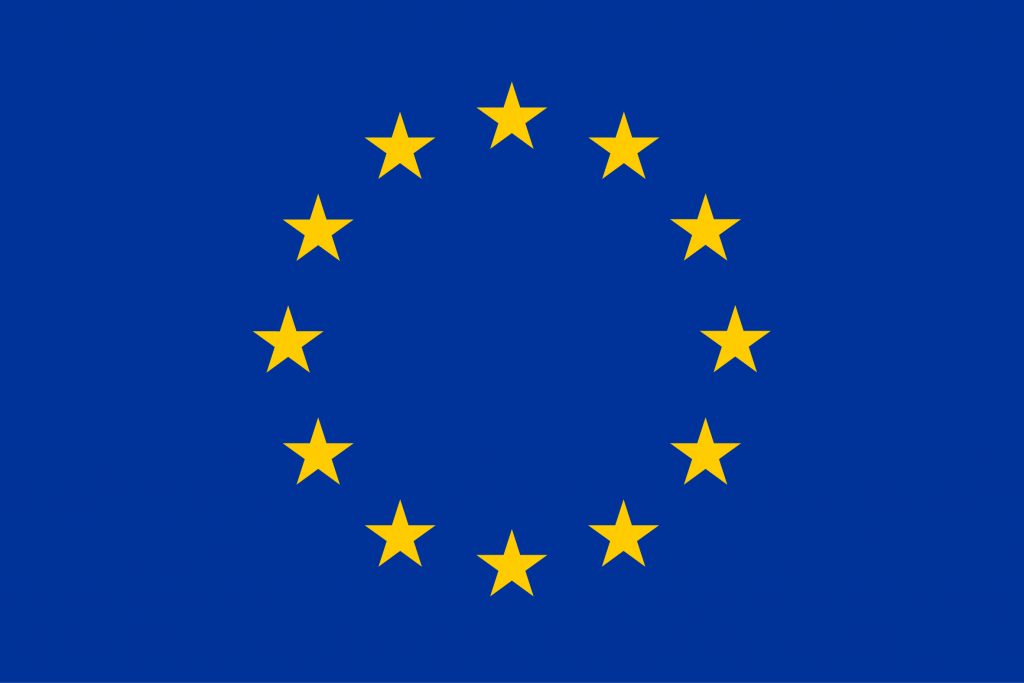
The Resonant Voices Initiative in the EU is funded by the European Union’s Internal Security Fund – Police.
The content of this report represents the views of the Resonant Voices Initiative’s media monitoring team and is the sole responsibility of the Resonant Voices Initiative. The European Commission does not accept any responsibility for use that may be made of the information it contains.
